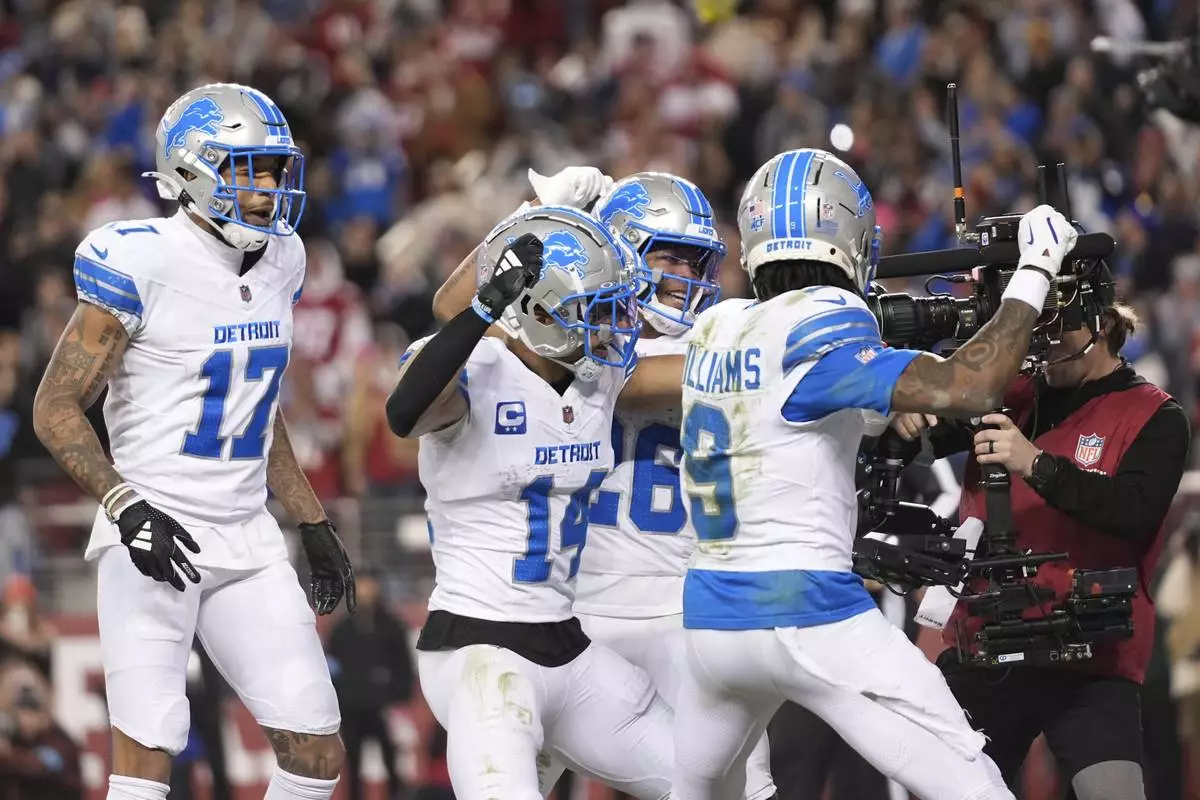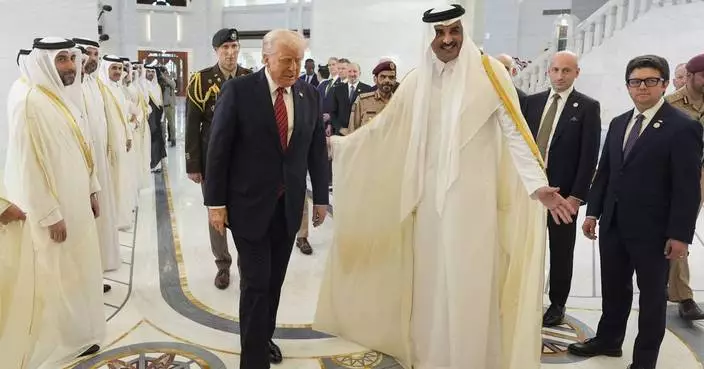SANTA CLARA, Calif. (AP) — The big prizes for the Detroit Lions remain on the horizon, with the team seeking a division title, the top seed in the NFC playoffs and the franchise's first Super Bowl trip.
With almost nothing at stake in a rematch of last season's NFC championship game that Detroit lost to San Francisco, coach Dan Campbell and the Lions approached it with the same sort of ferocity that has defined his tenure.
Click to Gallery
Detroit Lions tight end Sam LaPorta (87) catches a touchdown over San Francisco 49ers cornerback Isaac Yiadom (22) during the second half of an NFL football game Monday, Dec. 30, 2024, in Santa Clara, Calif. (AP Photo/Jed Jacobsohn)
San Francisco 49ers wide receiver Deebo Samuel Sr. (1) scores a touchdown during the second half of an NFL football game against the Detroit Lions, Monday, Dec. 30, 2024, in Santa Clara, Calif. (AP Photo/Jed Jacobsohn)
San Francisco 49ers quarterback Brock Purdy (13) runs for a touchdown during the first half of an NFL football game against the Detroit Lions, Monday, Dec. 30, 2024, in Santa Clara, Calif. (AP Photo/Jed Jacobsohn)
Detroit Lions wide receiver Amon-Ra St. Brown (14) catches a touchdown during the second half of an NFL football game against the San Francisco 49ers, Monday, Dec. 30, 2024, in Santa Clara, Calif. (AP Photo/Godofredo A. Vásquez)
Detroit Lions wide receiver Amon-Ra St. Brown (14) celebrates his touchdown catch with teammate during the second half of an NFL football game Monday, Dec. 30, 2024, in Santa Clara, Calif. (AP Photo/Godofredo A. Vásquez)
Detroit Lions running back Jahmyr Gibbs (26) scores a rushing touchdown past San Francisco 49ers cornerback Renardo Green (0) during the second half of an NFL football game Monday, Dec. 30, 2024, in Santa Clara, Calif. (AP Photo/Jed Jacobsohn)
Detroit Lions quarterback Jared Goff (16) celebrates after throwing a touchdown pass to wide receiver Amon-Ra St. Brown (14) during the second half of an NFL football game against the San Francisco 49ers, Monday, Dec. 30, 2024, in Santa Clara, Calif. (AP Photo/Jed Jacobsohn)
Detroit Lions quarterback Jared Goff (16) throws a pass during the first half of an NFL football game against the San Francisco 49ers, Monday, Dec. 30, 2024, in Santa Clara, Calif. (AP Photo/Godofredo A. Vásquez)
Jared Goff threw three touchdown passes and the Lions tuned up for their Week 18 division showdown against Minnesota by beating the 49ers 40-34 on Monday night.
“That’s the only way we know. It's just go and find a way to win,” Goff said. "This is what ended our season last year. There’s a lot of guys on this team that were there last year that wanted to get one back on them even though in a lot of ways it was meaningless for them and it was meaningless for us."
The stakes for this game were miniscule compared to the last meeting between the teams when a berth in the Super Bowl was on the line last January.
San Francisco was eliminated from playoff contention last week and Detroit plays Minnesota in the regular-season finale next week, with the winner earning the NFC North title and top seed in the NFC playoffs, and the loser relegated to being the first 14-win wild-card team in NFL history.
“This is just fairytale stuff,” Campbell said.
Had the Vikings lost on Sunday, Detroit could have clinched the division and No. 1 seed on Monday night. But now the win against the 49ers would only matter if Detroit and Minnesota tie in Week 18, with the Lions now set to earn the No. 1 seed in that unlikely scenario.
Campbell said he considered resting some starters but decided it would be unfair to the backups who hadn't prepared and the starters who still would have had to play. It all worked out, with the Lions getting the win and coming out healthy.
“I ended up settling on the right thing to do was playing those guys,” he said. "We owed it to the team. ... That was tough. I think the biggest thing is there was things we wanted to do better than we did last week, and we did."
Goff threw a go-ahead touchdown pass to Amon-Ra St. Brown in the final minute of the third quarter following the first of Kerby Joseph's two second-half interceptions against Brock Purdy.
That proved to be enough for the Lions (14-2) to complete a perfect regular season away from home, beat the 49ers (6-10) on the road for the first time since 1975 and get a small bit of revenge for last season's playoff loss.
“I still had that chip on my shoulder from last year,” Joseph said. “We were so close and we just came up short.”
Jahymr Gibbs put the game away with a 30-yard touchdown run with less than three minutes left following Purdy's second interception, giving him 117 yards on the night.
The offenses dominated for much of the night, with the teams scoring touchdowns on the first five possessions and Purdy and Goff combining to complete the first 17 passes of the game — including a perfectly executed hook-and-ladder play that led to a 42-yard TD for Goff.
He threw a short pass to St. Brown, who immediately pitched the ball to Jameson Williams, who streaked down the sideline for the final 41 yards and his second TD of the first half.
The only stops of the half came when Renardo Green broke up a pass in the end zone from Goff to Sam LaPorta and when Jake Moody missed a 51-yard field goal in the closing seconds for San Francisco.
Purdy threw a 5-yard pop pass for a TD on San Francisco's opening drive of the second half before Detroit's defense finally managed a stop when Joseph intercepted an overthrown pass by Purdy.
Goff turned that into a 4-yard TD pass to St. Brown on fourth-and-goal to give the Lions their first lead at 31-28 late in the third quarter.
Moody missed a 58-yard field goal that could have tied the game early in the fourth quarter for his ninth missed field goal of the season. Moody also missed an extra point after Joshua Dobbs scored on a TD run in the final minute.
“We weren’t able to slow them down enough on defense,” 49ers coach Kyle Shanahan said. “That’s a real good offense, but we still have to slow them down a little bit more. That was the difference in the game. We had to win in it in a shootout. I thought the difference was our two turnovers.”
Lions: RT Penei Sewell went to the locker room early at the end of the first half to get a thumb injury checked out but there is no concern about his status.
49ers: Purdy left late in the fourth quarter after hurting his throwing elbow on a sack. Purdy said his elbow “doesn’t feel the best” but initial testing showed his surgically repaired ligament from an injury sustained in the 2022 NFC title game against Philadelphia is fine.
Lions: Host Minnesota on Sunday night.
49ers: Visit Arizona on Sunday.
AP NFL: https://apnews.com/hub/NFL

Detroit Lions tight end Sam LaPorta (87) catches a touchdown over San Francisco 49ers cornerback Isaac Yiadom (22) during the second half of an NFL football game Monday, Dec. 30, 2024, in Santa Clara, Calif. (AP Photo/Jed Jacobsohn)

San Francisco 49ers wide receiver Deebo Samuel Sr. (1) scores a touchdown during the second half of an NFL football game against the Detroit Lions, Monday, Dec. 30, 2024, in Santa Clara, Calif. (AP Photo/Jed Jacobsohn)

San Francisco 49ers quarterback Brock Purdy (13) runs for a touchdown during the first half of an NFL football game against the Detroit Lions, Monday, Dec. 30, 2024, in Santa Clara, Calif. (AP Photo/Jed Jacobsohn)

Detroit Lions wide receiver Amon-Ra St. Brown (14) catches a touchdown during the second half of an NFL football game against the San Francisco 49ers, Monday, Dec. 30, 2024, in Santa Clara, Calif. (AP Photo/Godofredo A. Vásquez)

Detroit Lions wide receiver Amon-Ra St. Brown (14) celebrates his touchdown catch with teammate during the second half of an NFL football game Monday, Dec. 30, 2024, in Santa Clara, Calif. (AP Photo/Godofredo A. Vásquez)

Detroit Lions running back Jahmyr Gibbs (26) scores a rushing touchdown past San Francisco 49ers cornerback Renardo Green (0) during the second half of an NFL football game Monday, Dec. 30, 2024, in Santa Clara, Calif. (AP Photo/Jed Jacobsohn)

Detroit Lions quarterback Jared Goff (16) celebrates after throwing a touchdown pass to wide receiver Amon-Ra St. Brown (14) during the second half of an NFL football game against the San Francisco 49ers, Monday, Dec. 30, 2024, in Santa Clara, Calif. (AP Photo/Jed Jacobsohn)

Detroit Lions quarterback Jared Goff (16) throws a pass during the first half of an NFL football game against the San Francisco 49ers, Monday, Dec. 30, 2024, in Santa Clara, Calif. (AP Photo/Godofredo A. Vásquez)
MEXICO CITY (AP) — All of a sudden, women contacting one of the biggest sources of information about abortion in Mexico through the encrypted messaging app WhatsApp were met with silence.
The nongovernmental organization’s business account had been blocked. Weeks later, a similar digital blackout struck a collective in Colombia.
Across the Americas, organizations that guide women seeking abortions in various countries are raising alarm, decrying what they see as a new wave of censorship on platforms owned by tech giant Meta — even in countries where abortion is decriminalized. The organizations believe this is due to a combination of changes to Meta policies and attacks by anti-abortion groups that denounce their content.
While this also occurs on Instagram and Facebook, the blocking of organizations’ verified WhatsApp business accounts, which they use to communicate with people seeking help, has been particularly disruptive. These accounts are crucial for communicating with people seeking help, and their blockage has significantly complicated daily interactions between women and support providers.
Meta usually attributes its content blocking to policy violations, though it has acknowledged occasional mistakes. Since January, Meta changed the way it moderates content, now relying on user-generated notes “to allow more speech and reduce enforcement mistakes.” U.S. President Donald Trump has said the changes were “probably” made in response to his threats over what conservatives considered a liberal bias in fact-checking.
Among the organizations whose WhatsApp business accounts were suspended is the MSI Foundation (formerly Marie Stopes), part of a network working in Mexico for 25 years. Its account was suspended in February, and the Colombian group Oriéntame, or Guide Me, which has worked in women's health in Colombia for decades, was labeled by Instagram as “dangerous.”
While conservatives cheered the change in Meta moderation policies, organizations helping women who seek abortions say they often result in over-enforcement, likely driven by Artificial Intelligence, which disproportionately flags or removes their posts — obstacles that have increased since the start of the Trump administration.
“It is not always intentional censorship, but the outcome is still more censorship for us and our partners,” said Martha Dimitratou, cofounder of Repro Uncensored, an organization that monitors digital suppression of reproductive health content.
“From one day to the next they blocked communication between our users and women who need first-hand information” to address doubts or look for medical follow-up with MSI, said Araceli López-Nava, the organization’s Latin America director.
In the days after the suspension, appointments dropped 80%
López Nava said that MSI had previously faced issues with regular WhatsApp numbers, because it’s easy to file complaints. So, the organization thought it would be different with a business account, which gives them a platform to manage the thousands of messages they receive every month.
That wasn't the case. After an initial suspension, MSI's WhatsApp business account was permanently suspended two weeks later. The reason cited in Meta’s notification? “Sending spam.”
“The argument is that they’ve received complaints, but from whom?” López-Nava asked. She said the organization can’t be accused of sending spam because they only answer those who contact them and provide information in line with Mexican law. Abortion is decriminalized in Mexico at the federal level and in the majority of its 32 states.
“It looks like an orchestrated strategy to us,” López-Nava said. “And not necessarily by Meta."
Dimitratou, who is also digital strategist for Canada-based Women on Web and the U.S.-based Plan C, said cases of blocked content have increased since Trump’s election, not only in the U.S., but around the world, likely driven by anti-abortion groups.
Conservative or religious groups have a history of attempting to leverage technology companies to obstruct abortion supporters’ efforts, but the anonymity of app reporting prevents organizations from proving who is behind it.
That is why MSI and an ally NGO, Women’s Link Worldwide, have asked Meta to implement transparent mechanisms to be able to appeal the company’s decisions and to respect international human rights standards. They have not received a response.
A Meta spokesperson told The Associated Press that MSI's WhatsApp business account was blocked for valid reasons, saying that organizations receiving numerous negative comments receive warnings before suspension. Meta declined to provide details about the nature of the negative comments or comment on whether they could be coordinated by anti-abortion groups aiming to paralyze MSI.
The Instagram accounts of Women on Web United States and Women on Web Latin America were suspended right after the U.S. presidential election in November, though they were later reinstated. Dimitratou said that Meta has also limited the organization’s ability to place ads on accounts in Latin America, South Korea and West Africa.
Repro Uncensored has documented at least 60 instances of similar digital censorship since January. The most recent occurred this week, when Thailand's TamTang Group said that Facebook had accused them of violating rules on selling medicines simply for sharing information about free abortion pills provided by the Thai government.
A 2025 report by the California-based Center for Intimacy Justice, based on a survey of 159 nonprofits worldwide, found that major tech platforms were removing ads and content related to abortion and other women’s sexual and reproductive health issues like menopause.
When asked about the report, Meta downplayed its findings, noting that it was based on a small number of examples.
Tech companies often cite policies against explicit or inappropriate sexual content or the advertisement of unsafe substances, such as abortion pills, even though the World Health Organization has said they’re safe.
In April, months after Meta announced changes to ensure greater freedom of expression, Oriéntame, the Colombian collective that offers reproductive health services, posted on Instagram a drawing of a heart and the phrase “Abort without pain.” The post was blocked with the explanation: “Dangerous people and organizations, photo removed.”
While Colombia legalized abortion in 2022, Oriéntame experienced censorship of at least 14 of their posts on Instagram in April 2025. That same month, their WhatsApp business account was suspended, said Tatiana Martínez, who manages their social media. Although the WhatsApp account was restored after a week, they worry it could happen again.
A Meta spokesperson said this week that the Instagram posts were mistakenly taken down and not the result of a change in its content standards.
Oriéntame director María Vivas says the organization has been battling Google for years over online content limitations. The tech giant said in a message to the AP that it only restricts content when it violates policies. But Google keeps Colombia on the list of countries with restrictions on abortion ads — even though abortion was decriminalized there in 2022.
As for their problems with Meta, Vivas said they started in late 2024, when the company started to change some of its internal policies.
Taking legal action against tech giants, when each country has its own laws, is complicated. As a result, affected organizations have turned to creative strategies, like operating multiple backup accounts, having a substitute ready when one is blocked and reformulating language in posts to avoid censorship triggers.
“It feels like Meta is our boss,” Vivas joked about the ongoing struggle with the tech giant over the basic right to provide health information. “We live to respond to Meta, to adapt ourselves to Meta,” she said. “That's absurd.”
AP journalist Maria Cheng contributed to this report from New York.
Follow AP’s coverage of Latin America and the Caribbean at https://apnews.com/hub/latin-america

A computer monitor shows the splash page of the MSI Foundation website with a message that reads in Spanish: "Your body, your choice, your future", during a tour of the foundation, a non-governmental agency that offers information and help to women seeking abortions, in Mexico City, Thursday, May 8, 2025. (AP Photo/Marco Ugarte)

A health worker gives a tour of the MSI Foundation, an organization that offers information and help to women seeking abortions, in Mexico City, Thursday, May 8, 2025. (AP Photo/Marco Ugarte)

A health worker gestures towards a message that reads in Spanish; "My decisions, my road, my steps" during a tour of the MSI Foundation, an organization that offers information and help to women seeking abortions, in Mexico City, Thursday, May 8, 2025. (AP Photo/Marco Ugarte)

A health worker gives a tour of the MSI Foundation, an organization that offers information and help to women seeking abortions, in Mexico City, Thursday, May 8, 2025. (AP Photo/Marco Ugarte)






































































